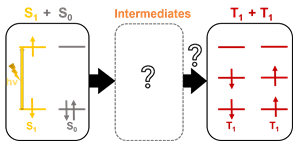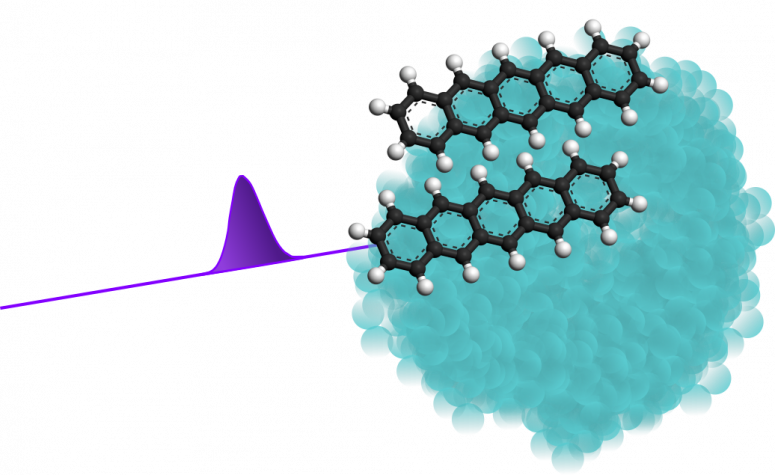Accueil > Équipes scientifiques > Dynamiques et Interactions : Rayonnement, Atomes, Molécules (DIRAM) > Offres de stage, thèses, post-docs > Deciphering the Singlet Fisssion process with a Physical-Chemistry approach
M2 Physical Chemistry Internship (Experiment)
Deciphering the Singlet Fisssion process with a Physical-Chemistry approach
M2 Physical Chemistry Internship (Experiment)
par - 6 septembre 2023
Singlet fission is a spin-allowed process involving at least two organic chromophores in which a photo-generated singlet exciton can spontaneously down-convert to give two lower-energy triplet excitons with a theoretical quantum yield of triplet formation up to 200%. When used in organic photovoltaic devices, this process would tremendously increase the efficiency of single-junction solar cells [1]. Singlet fission has thus recently received a strongly growing interest for solar energy conversion. However, a full mechanistic description with a detailed interpretation of all intermediate processes leading to independent triplets is still far from achieved.

In this internship, we propose to study the singlet fission process on isolated chromophores in the gas phase, with a time-resolved approach, at the femtosecond (1 fs = 10^-15s) to hundreds of picoseconds (1 ps = 10^-12s) timescale. Controlled stoichiometry complexes (monomers and dimers) will be formed in the gas phase. The singlet excitation will be photo-initiated by a femtosecond laser, and the relaxation processes leading to the triplet formation will be probed by photoelectron spectroscopy [2]. The photoelectron spectra will be analyzed will Python.
Practically, we will start by studying the target molecule (tetracene or pentacene, organic semiconductors) isolated in the gas phase. Then, the dimers formed in a controlled way using deposition of the gaseous tetracene or pentacene molecules on a rare gas cluster [3,4] will be studied.
The M2 internship could be followed by a PhD thesis.
Contact : Lionel Poisson
[1] A. J. Baldacchino, et al., Singlet fission photovoltaics : Progress and promising pathways, Chem. Phys. Rev., 2022, 3, 021304.
[2] J. Hoche, et al., Excimer formation dynamics in the isolated tetracene dimer, Chem. Sci., 2021, 12, 11965-11975.
[3] M. Briant, et al. Reaction Dynamics within a Cluster Environment, Phys. Chem. Chem. Phys. 2022, 24, 9807-9835.
[4] A. Lietard, et al. Excited state dynamics of normal dithienylethene molecules either isolated or deposited on argon cluster, Phys. Chem. Chem. Phys. 2022, 24, 9807.



